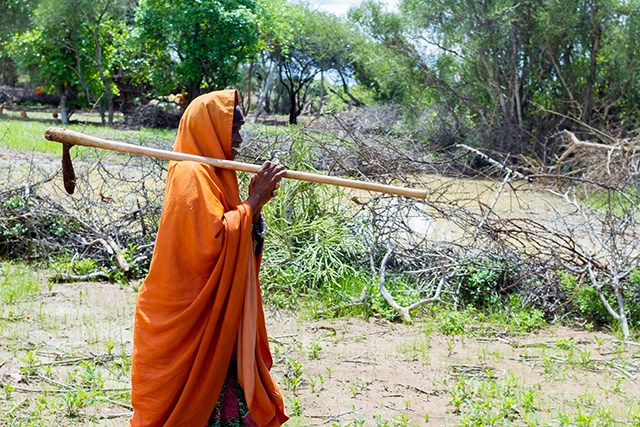
Thursday July 2, 2020

FAO delivers agricultural inputs and cash transfers to vulnerable farmers in rural Somalia thanks to funding from the European Union’s humanitarian aid programme.
The prolonged dry spell in early 2019 ended with late, poor and erratic rains across the Gu cropping season
(April‒June). As expected, the result was a poor yield, bringing hardship to many landless farming households such as Madino’s.
At 21 years old, Madino is the head of her household and lives with her three children, husband and grandmother in the riverine village of Busley in Kurtunwarey district, Lower Shabelle region.
By August, Madino’s family no longer had food stock nor seed to plant on the farmland they rent twice a year. The new Deyr planting season (October‒December) was fast approaching and their financial straits were only worsening. Faced with no other options, they desperately considered selling two of the four goats and sheep they owned. Madino’s family was in great need of help.
Cash+
Integrated cash and livelihood assistance
Fortunately, Madino met the vulnerability criteria of the European Union humanitarian aid-funded project FAO was delivering in her region.
The news came as a great relief for her and her family. They would no longer need to sell any of their few animals. Moreover, they would receive cash to buy food and satisfy their other immediate needs and could redeem quality agricultural inputs to make the most of the new cropping season. All in all, cash+ support meant a chance to escape from hunger and poverty.
Through FAO’s cash+ programme, beneficiary farmers in southern Somalia receive farm inputs and training to cultivate a nutritious variety of food crops, alongside unconditional cash transfers for three months (the duration of the cropping season).
In order to make the most of the one hectare of land her family rents, Madino received 10 kg of cowpea, 20 kg of maize, and 240 g of assorted vegetable seeds; 30 storage bags; and farming tools: one fork and one hoe.
Along with another 20 700 families, she also received three monthly cash payments totalling USD 132, which would cover the basic needs of the family during the lean season, until the Deyr harvest.
Mobile money is safer, more efficient and convenient
Like most Somalis, Madino preferred to receive cash assistance on her cell phone. To register, she simply met trained agents to record her details and fingerprints through an app developed by FAO called BiMo.
FAO’s Mobile Money platform is a safer modality for users as they do not need to travel to money vendor offices to collect their cash entitlements. Instead, the system transfers the money directly to the mobile phone of verified beneficiaries. These mobile money payments avoided Madino’s exposure to the risk of carrying cash from one place to another in an area affected by insecurity. Furthermore, the system ensures that aid reaches the right people in a user-friendly way. The next upgrade of the system aims to incorporate voice and facial recognition apps.
“It's an innovative and safer way to support the most vulnerable people in rural areas. Now especially with the COVID-19 pandemic, we are able to serve people in some of the country's most remote and insecure regions, without disruption caused by the virus,” says Etienne Peterschmitt, FAO Representative in Somalia.
Good yield
Abundant rains during the season along with Madino’s hard work produced a good Deyr yield. She was able to reap four bags of cowpeas and three bags of maize, which she says her family is still relying on. Moreover, they expect to be able to harvest sweet pepper, onions and coriander soon. "The yield provided enough food for the whole family and we are much better than before in terms of our daily needs. The inputs received have made a difference, but we still need help as we are vulnerable," says Madino.
The good Deyr yield and food stocks has also helped shield Madino’s family from increasing food prices triggered by the ongoing COVID-19 pandemic.
“I will not forget this help. I am very grateful, and I hope that the European Union humanitarian aid programme and FAO continue delivering this kind of support to families in need,” she said.